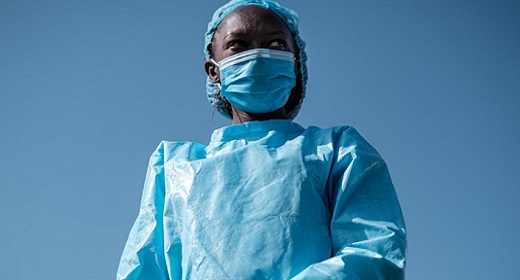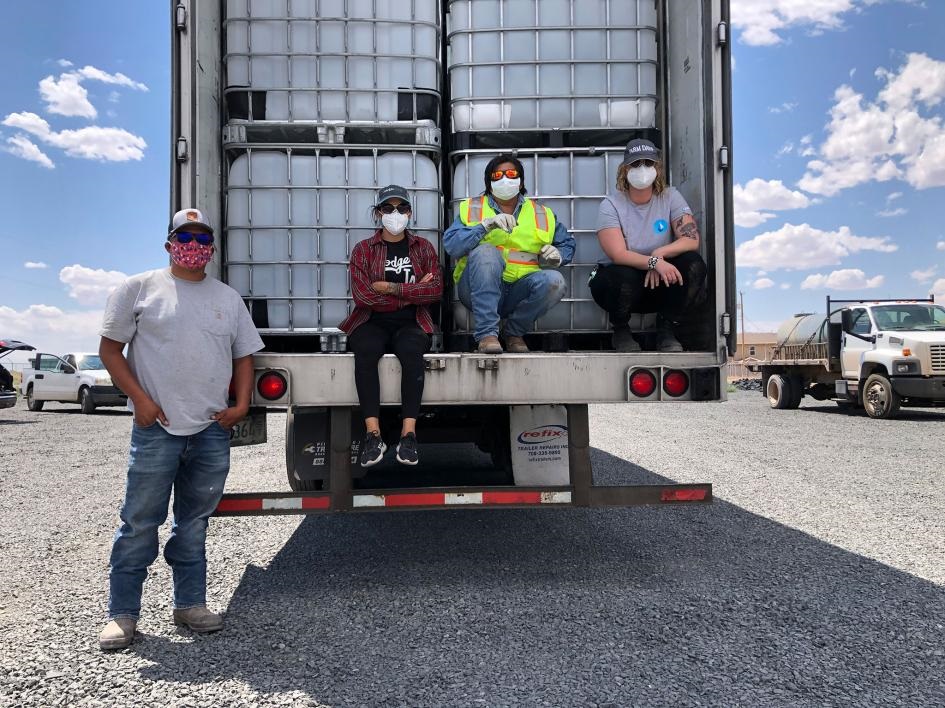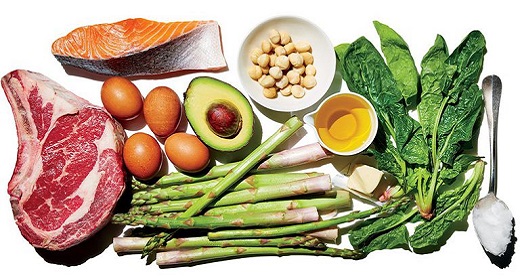by Rachel Jones: They’re ‘the shock absorbers of society’: a majority in the global health workforce, but scarce in its leadership ranks. Can that change?
In mid-May, Emma Robbins boarded a private plane in Van Nuys, California, with just three passengers: herself, Academy Award-winning actor Sean Penn, and renowned video and film director Sam Bayer. Penn and Bayer were heading to the Navajo Nation for a meeting with President Jonathan Nez to discuss how Penn’s humanitarian aid organization, Community Organized Relief Effort (CORE), could provide assistance, including COVID-19 testing, to the reservation during the pandemic. They invited Robbins to come along.
The 33-year-old artist and community activist almost didn’t accept the last-minute invitation—she had too much to do in her Los Angeles office. But she couldn’t pass up the chance for a quick trip to the place where she grew up and where she serves as Navajo Water Project director for DigDeep, a nonprofit seeking to expand access to clean water in the United States.
One third of the people living in the Navajo Nation do not have clean water and indoor plumbing—a dangerous public health situation made catastrophic by the pandemic. The week of Robbins’ star-studded flight, COVID-19 infection rates on the reservation surpassed those in New York and New Jersey, making them the highest in the nation. The federal government has designated $600 million to the Navajo Nation in the Coronavirus Aid, Relief, and Economic Security (CARES) Act.
“Everyone has an opinion about what to do with the money,” Robbins says. “But look, why do we have this high infection rate? It’s because people don’t have access to clean water. They have to travel, they need to wash their hands, there’s no sanitation. Mentally it’s wearing people down. I knew if I joined the conversation, I could make an impact.”
One third of the residents of Navajo Nation don’t have clean water or indoor plumbing, which makes following pandemic precautions to wash hands difficult (left). At a distribution point for water and supplies (right), the line of cars stretches down the road.
Robbins’ practical approach toward battling COVID-19 mirrors that of many women around the world who are directly involved in pandemic response. Whether as front-line health workers, nursing home care givers or community activists, women are logging long hours managing the fallout of COVID-19, while juggling their own childcare and family responsibilities throughout the pandemic. (Meet the French doctor who serves as a lifeline for her rural community.)
When it comes to decision-making and leadership roles during this emergency, though, there’s a glaring disparity for women. World Health Organization data estimates that while women comprise 70 percent of the global health workforce, they hold only 25 percent of leadership positions. A February photo of the U.S. Coronavirus Taskforce led by Vice President Mike Pence sparked controversy because it showed only men.
Women across a range of health care arenas have identified the COVID-19 crisis as the scenario that gives them leverage to boost those leadership numbers. More women taking the lead on global health policies and emergency response will inevitably translate into positive change, says Winnie Byanyima, executive director of the Joint United Nations Programme on HIV/AID (UN AIDS).
“People who have historically been on the outside transform a situation, because they bring new perspectives, new issues, new needs to the table,” says Byanyima, a Ugandan who has spent a lifetime breaking barriers. She earned an aerospace engineering degree and worked for Uganda Airlines before joining the National Resistance Army in its fight to overturn then Ugandan President Milton Obote. She later served as executive director of OxFam International.
Decades of political activism fueled Byanyima’s rise to the top ranks of global health leadership. “My story is like that of many other women from poor countries, faced with one crisis after another demanding solutions,” she says. “You stand up because you think you have an answer. You organize and you search for a solution. That’s how I grew in my leadership, by always wanting to be part of finding a solution to the biggest problem we face.”
Regarding COVID-19, Byanyima says the world need look no further than at the successes of countries with women leaders. Germany, Norway, and New Zealand have been widely praised for their progress in testing, contact tracing, and containing the spread of the coronavirus. In fact, an analysis of COVID-19 responses by the group Open Democracy found that countries with women in leadership positions have suffered six times fewer confirmed COVID-19 deaths than governments with men at the top. And female-led governments have been able to flatten the coronavirus curve and move toward safely reopening sooner.
“Take someone like Jacinda Ardern [New Zealand’s prime minister],” says Byanyima. “She has been hit by the biggest challenges in just her first term in office. She has had an earthquake, she has had a terrorist attack, she’s now facing COVID-19. But she’s so admired because her approach in each case is out of the box. It is empathetic, it is transformative, and it is a multi-tasking approach.”
Though research shows that men are more likely to suffer from severe COVID-19 complications, women front-line health workers face a much greater risk than men of contracting the disease, says Michelle McIsaac. An economist and health workforce specialist at the World Health Organization, McIsaac leads its program on gender and equity in the global health workforce.
“We’ve heard that women are more liable to be affected by shortages of personal protective equipment, or lack of training in how to use PPE,” McIsaac says. And what’s worse, much of the available PPE, including full-body gear, is designed by men and is often not adaptable to women’s bodies, nor does it take into account their menstrual needs.
Healthcare workers arrive for their shift at Grady Memorial Hospital in Atlanta, Georgia, where COVID-19 cases are rising.
PHOTOGRAPH BY AUDRA MELTON, THE NEW YORK TIMES/REDUX
In the face of lower pay, insecure contracts, and the violence and aggression against health care workers overall, female frontline health care workers are inarguably more vulnerable. “This pandemic has demonstrated that women are the ‘shock absorbers’ of society,” says Roopa Dhatt, who was still in medical school when she founded Women in Global Health to address gender equity in health leadership.
Women in Global Health recently partnered with Pathfinder International to establish chapters in Burkina Faso, Ethiopia, Niger, Nigeria, and Pakistan. “Who’s leading—whether it’s at the national level, or at a health system within a hospital—matters not only from a gender perspective but from a broader diversity perspective,” Dhatt says. “Women need to be shaping health systems at every level.”
One of the biggest issues the organization tackles is the gender gap in compensation for women in the health sector. “Beneath the picture of women’s heroism on the frontlines is the fact that half of what women do in the health sector is currently unpaid—which equals $1.3 trillion annually,” says Dhatt. “And if we factor in the unpaid social care work, estimates go up to even $10 trillion.”
Shaandiin Parrish, the current Miss Navajo Nation, prepares to distribute food, water, and other supplies in Huerfano on the Navajo Nation.
PHOTOGRAPH BY SHARON CHISCHILLY/GETTY IMAGES
Effectively promoting gender equity and leadership may require taking a more nuanced approach to data collection, says Shirin Heidari, founding president of GENDRO, a Geneva-based NGO that supports gender equity through academic research.
As an example, she says, “countries are not producing enough gender-related data on infection rates, or mortality among health care workers. A study from the early days of the pandemic from China found that women frontline workers have a higher risk of severe mental health challenges, depression, insomnia, anxiety—but we really need to understand this dynamic better.” (Hear from a Baltimore nurse coping with the unrelenting pressure of the virus.)
Women leaders including Byanyima say their presence on the global stage is crucial as this crisis lengthens, to ensure that there’s equity across the board as medical treatments and prevention tools are developed.
A healthcare worker taking a break is illuminated by the headlights of a taxi bringing a patient to a clinic in the Rocinha favela in Rio de Janeiro, Brazil.
PHOTOGRAPH BY LEONARDO CARRATO, VII/REDUX
“I’m still fighting for a commitment that, should a vaccine come out, the first to be served are frontline health workers,” Byanyima says. “It can’t be that if a vaccine is found, a child in a rich country like the UK gets vaccinated and a frontline worker in Burkina Faso is in the back of the queue because her country is poor. That is too much of an injustice.”
Sometimes fighting injustice means seizing improbable opportunities, such as flights on private planes with movie stars. When Emma Robbins visited the Navajo Nation and met with its president, Jonathan Nez, she jumped right into the conversation, emphasizing water access and indoor plumbing needs for the Navajo Nation. Later she submitted a proposal to strengthen infrastructure using CARES Act funding.
Since April, DigDeep has distributed 262,000 gallons of bottled water, and helped 300 Navajo families get hot and cold running water. By the end of July, about 300 water storage tanks will be in place.
Having a seat at the table makes all the difference, Robbins says.
“It’s important that the people with power don’t forget about what I represent, as a Navajo woman, for these projects and for my team,” she says. “That’s the lesson I learned from the women in my family: to take care of your community, because it’s much more than caring for individuals—it’s caring for our culture and making sure that everybody is elevated.”

















































